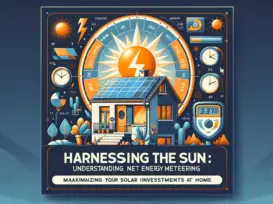Grus Home Energy - Residential Solar Installation
Unlocking Sustainable Living: The Complete Guide to Residential Solar Panel Installation
Unlocking Sustainable Living: The Complete Guide to Residential Solar Panel Installation
As the world increasingly turns towards sustainable and renewable energy sources, residential solar installation is becoming a popular choice for homeowners looking to reduce their carbon footprint and save on electricity costs. Solar panels convert sunlight into electricity, providing a clean, renewable source of power for your home. This guide will walk you through the key considerations and steps involved in residential solar panel installation, empowering you to make an informed decision on this eco-friendly investment.
Before embarking on the installation process, it’s important to determine whether your home is suitable for solar panels. Factors such as roof condition, orientation, shading, and local climate all play a significant role in the efficiency of a solar power system. Generally, roofs with a south-facing orientation without significant shade and with enough structural strength are ideal for solar panel installation. A professional assessment can help you ascertain the feasibility and potential benefits of installing solar panels on your property.
Once you’ve confirmed that your home is a good candidate for solar, the next step is to understand the various components of a solar power system. The primary elements include solar panels, an inverter, mounting hardware, a performance monitoring system, and sometimes a battery storage system. The inverter converts the direct current (DC) produced by the solar panels into alternating current (AC), which is what powers your home. Battery storage systems can store excess electricity for use during nighttime or cloudy days, although they are not always necessary and can be added at a later stage.
Finding the right contractor is crucial for a successful solar panel installation. It’s essential to work with a certified and experienced solar installer who can oversee the project from start to finish. They will help with obtaining the necessary permits, performing the installation according to local regulations and industry standards, and ensuring you’re eligible for any available rebates or incentives. These incentives, which can include tax credits, rebates, and renewable energy certificates, can significantly reduce the overall cost of your solar panel system and should be thoroughly researched before making a decision.
Cost is often a primary concern when it comes to residential solar installation. While the upfront cost can be substantial, it’s important to consider the long-term savings on energy bills. The cost of solar panels has decreased dramatically in recent years, making them more accessible to a wider range of homeowners. Additionally, many solar companies offer financing or leasing options, which can help make residential solar installation more affordable.
Solar panel maintenance is comparatively minimal, but it’s still an important factor to consider. Ensuring that your panels are clean and free of debris will help them operate at maximum efficiency. Most solar systems come with a warranty, typically covering 20 to 25 years, which can give you peace of mind regarding performance and durability of your solar panels over time.
In conclusion, residential solar installation is a smart choice for homeowners who want to embrace a sustainable lifestyle while also potentially saving money in the long run. By understanding the installation process, choosing the right contractor, and taking advantage of financial incentives, you can make solar panels a valuable addition to your home. With the growing concern for the environment and the advancement in technology, solar energy stands out as an excellent investment for the eco-conscious homeowner.
©2025 All Rights Reserved. Grus IoT Co.,Ltd.
